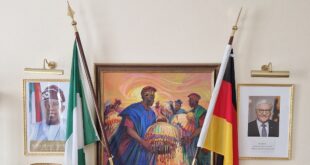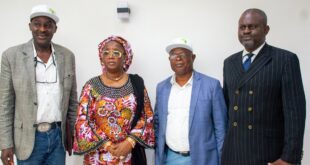The leaders of Brazil, Russia, India, China and South Africa have a series of ambitious plans as South Africa hosts the 10th summit of the BRICS bloc in Johannesburg. Martina Schwikowski reports.
South Africa’s government is hosting the tenth BRICS annual summit in Johannesburg on July 25-27, 2018. The Summit will be held under the theme: “BRICS in Africa: Collaboration for conclusive Growth and Shared Prosperity in the 4th Industrial Revolution”
South Africa, which holds the rotating chair for 2018, hopes to strengthen its local economy by cooperating better with BRICS partner countries.
Ramaphosa wants to rebuilt trust
For South Africa’s new president, Cyril Ramaphosa, the summit is an opportunity to present his ambitious reform plans to the international community. Under his predecessor Jacob Zuma, South Africa lost its economic supremacy in Africa.
Despite the country’s considerable potential, it slid into a political crisis triggered by corruption scandals and abuses of power. Ramaposa replaced Zuma as president in February, nine years after the ruling party stalwart was elected to lead the country.

Ramaphosa wants to use the meeting in Johannesburg, which Russian President Vladimir Putin, India’s Prime Minister Narendra Modi and China’s President Xi Jinping are expected to attend, to strengthen the confidence of foreign investors in South Africa and to demonstrate how the country has changed politically.
“Honestly, in recent years, South Africa has lost ground in domestic and foreign policy,” said Philani Mthembu, Executive Director of the Institute for Global Dialogue, a South African think tank.
“Now [Ramaphosa] can set out his priorities that the Department of International Relations has hammered out,” Mthembu told DW.
That doesn’t mean, however, that South Africa is moving away from its traditional partners, such as the European Union and the United States. “Rather it shows that BRICS is an important element of South African policy,” Mthembu said.
Show more initiative
Believing that many global institutions are too dominated by the West, the BRICS group of countries want to develop their own institutions.
The New Development Bank – founded in 2014 – aims to make emerging economies more independent of the International Monetary Fund and the World Bank. The bank grants loans for public and private infrastructure and sustainable development projects that will be discussed at the summit.
The Shanghai-based bank has already approved loans for projects in China, India, Brazil and South Africa. Brazil has expressed an interest in strengthening the institution and promoting more projects.

But leaders won’t just discuss economic issues at the BRICS summit.
“It will also be about good governance, as well as joint approaches to science and education projects,” said South African BRICS expert Ari Sitas.
South Africa wants to counter earlier criticism that it hasn’t be involved enough in developing projects and initiatives.
Support vaccine research
According to Sitas, South Africa’s proposals for the BRICS summit also include the creation of a vaccine research center in Africa to develop vaccines against diseases such as malaria, HIV and tuberculosis. Energy and environmental issues – such as the reduction of fossil fuels – as well as the creation of a BRICS gender and woman forum are also on the agenda.
“Ramaphosa brings new energy, but he hasn’t had a chance to propose other ideas that bear his signature,” Sitas told DW.
The power relations within the BRICS group are unbalanced – South Africa’s economic output is quite low, China is the driving force.
“China plays a major role and has done much in terms of infrastructure in Africa in the past decade,” said Mthembu. China alone contributes nearly two-thirds of the group’s total economic output.
“If China were to fail, that would have a big impact on other countries, but what’s important is that all decisions are made unanimously – that balances the power gap,” he said.

BRICS on probation
But that is one of the reasons why there is a will for further cooperation, Jakkie Cilliers from the South African Institute for Security Studies told DW. “Everyone is trying to benefit from the special relationship with China,” he said.
And that’s also why BRICS is important for South Africa. “We only contribute about three percent to BRICS’s economic performance, but we are considered by our partners as the leading nation in Africa,” said Cilliers.
South Africa is China’s largest trade partner in Africa.
Xi, ahead of his arrival for the BRICS summit, signed 15 bilateral deals with Rwanda, including loans and grants worth million of dollars, during a visit to the country in east Africa. The Chinese president’s Africa trip began in Senegal and his last stop is the Indian Ocean island of Mauritius.
It is unclear how BRICS will continue in the long term. Next year’s summit is due to take place in Brazil, which is facing presidential elections in October 2018.
“The test for BRICS is whether it can survive political change at the respective national levels,” said Sitas. “BRICS is still at the beginning and still trying to find out what the cooperation really means.”
© DW
All graphics: © #BRICSZA
 THE AFRICAN COURIER. Reporting Africa and its Diaspora! The African Courier is an international magazine published in Germany to report on Africa and the Diaspora African experience. The first issue of the bimonthly magazine appeared on the newsstands on 15 February 1998. The African Courier is a communication forum for European-African political, economic and cultural exchanges, and a voice for Africa in Europe.
THE AFRICAN COURIER. Reporting Africa and its Diaspora! The African Courier is an international magazine published in Germany to report on Africa and the Diaspora African experience. The first issue of the bimonthly magazine appeared on the newsstands on 15 February 1998. The African Courier is a communication forum for European-African political, economic and cultural exchanges, and a voice for Africa in Europe.


























